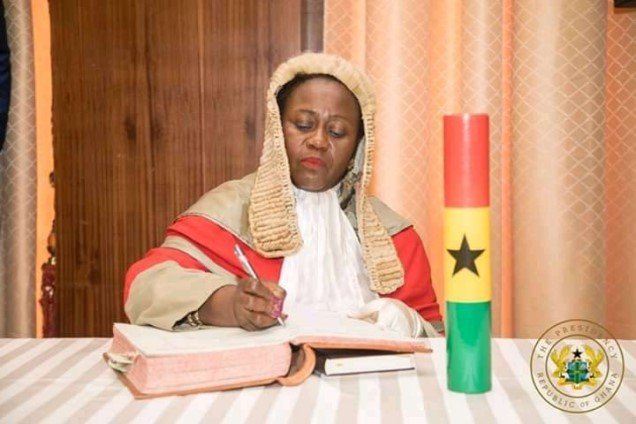
Mrs Ursula Owusu-Ekuful displays the signed agreement at the virtual meeting
Some 14,700 Ghanaians across the country have been targeted to benefit from digital skills training over the next three years.
The initiative will provide the public, particularly women entrepreneurs, pupils, teachers and marginalised groups, with the skills needed for employment, via the 241 Community ICT Centres (CICs) of the Ghana Investment Fund for Electronic Communications (GIFEC).
The training comes under the Country Digital Acceleration Programme initiated by International Telecommunications Union (ITU) to build an inclusive digital society where lack of digital skills should not be a barrier to participation in the digital economy.
The collaboration has also led to the Norwegian government supporting Ghana with $3million grant as part of measures to strengthen ties between both countries.
To this end, an agreement has been signed by ITU, the Norwegian government and Ghana to support the Digital Transformation Centres (DTCs) initiative in Ghana.
Ghana’s digital quest
Speaking at a virtual meeting to seal the agreement, the Minister of Communications, Ursula Owusu-Ekuful, said on the back of the initiative, the World Food Programme intends to use the centres to train 1.4 million farmers.
“The World Food Programme is going to utilise these centres in training 1.4million farmers in the food value chain. So, we are doing 14,700 with the potential to scale up to reach all interest groups and stakeholders in the country,” she said.
She noted that COVID-19 pandemic has shown that digital technology is the foundation of modern living.
She therefore praised the government’s effort to digitise the country, over the past three years, which has made a positive impact on the lives of individuals and institutions across the country.
“Since 2017, the Ministry of Communications, through GIFEC, has provided connectivity to over 2,000 communities as part of the rural telephony project and enhancing socio-economic lives of over 1.2 million citizens in rural Ghana,” she said.
“Over the past four years, a total of 502,600 persons have been trained in ICT programmes. 182,000 children have been trained to provide solutions to social problems through the Coding for Kids project,” the Minister added.
Mrs Owusu-Ekuful disclosed that the government is in the process of expanding access to an additional 2,026 communities to connect some three million people, thereby providing 95 per cent of the citizenry with voice and data connectivity within the next 18 months.
“That is some of the use we are putting our universal access fund to and have secured a credit facility to finance this project upfront,” she disclosed.
According to her, in spite of Ghana’s steady development in ICT over the years, the sector is still male dominant. So far, some 400 women have been trained in Asumura, Goaso, Berekum and Asankrangwa.
“In addition to this, over 3,500 girls have been trained in coding and basic ICT as part of the Girls in ICT initiative, an ITU programme, which seeks to arouse the interest of girls in the subject of ICT,” she said.
Digital gap
The Communications Minister noted that in spite of efforts by the Ministry to facilitate the expansion of ICT to rural areas, there is a wide digital skill gap between citizens in urban and rural areas.
She described as relieving ITU’s decision to include Ghana in the DTC programme, and expressed gratitude to the Norwegian government for its immense support for the programme, and to Cisco for the provision of content for the training.
The DTC initiative was launched in conjunction with Cisco and its Country Digital Acceleration Programme and Cisco Networking Academy in 2019, and operates in nine countries in Africa, Asia-Pacific and Latin America.
The new partnership with Norway will also help DTCs, particularly in Ghana, to accelerate building an inclusive digital society to ensure that lack of knowledge and skills is not a barrier to participation in the digital economy, and to contribute to the achievement of the 2030 Sustainable Development Agenda.




